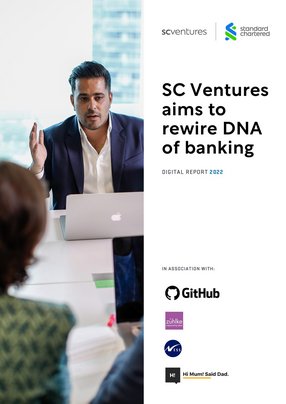Traditional banking is under pressure to adapt as society continues to not only evolve digitally, but also increasingly accelerate by emerging technology and innovation.
With digital transformation taking place at a rapid pace, banks are undergoing significant changes to meet the evolving needs of customers and stay ahead of the innovation curve – particularly with fintech moving into the traditional financial services sector. Oftentimes, the out-of-the-box fintech solutions offered by nimble start-ups have proven their worth to investors and, ultimately, in the adoption by banks. The innovation remains external.
It’s not quite the same story for Standard Chartered Bank, though. With a business unit that invests time and money into innovation and start-ups to build pioneering solutions while developing valuable partnerships with a broad spectrum of technology services providers, Standard Chartered Bank has a significant and unique competitive advantage as a result of the SC Ventures platform.
SC Ventures is the bank’s response to the rapid acceleration of the fintech space, with Thorsten Neumann leading technology function – which is always in the market for new fintech and technology adoption. Currently, the platform is fully invested in leveraging the Bank’s capabilities, with a total portfolio of over 30 ventures at different stages working to fill the monetizable gaps in the market.
Beyond its activities in internal intrapreneurship and the US$100mn growth-stage fund, SC Ventures focuses on six key high-conviction themes, including Digital Banking & Lifestyle, Online Economy & Payments, SMEs & world trade, Digital Assets, Capability-as-a-Service, and Sustainability & Inclusion.
“We are thinking about novel value propositions. For example, by playing to our strengths, we could brainstorm on the agricultural sector by addressing the needs of farmers in terms of seed financing, supply chain, product take-off and logistics solutions to extend the ecosystem in the thematic area of sustainability, and then build out a robust and scalable Cloud-native platform for stakeholders,” Neumann explains.
“We believe we can have a lot more impact in delivering disruptive business models in emerging markets because of the in-house domain expertise, the Bank’s large footprint and deep local market knowledge through our linkage with the Bank.”
Neumann joined SC Ventures a few months before the start of the pandemic to lead in the role of its CTO and has witnessed one of the toughest periods for businesses. Based in Singapore, he previously co-founded start-ups in the finance and payments sectors, and worked many years in Africa and SE Asia emerging markets. He has a passion for technology and his mission is to enhance the competitive advantage of SC Ventures by accelerating innovation.
Remaining competitive and encouraging fintech growth
Staying abreast of the latest financial trends, Neumann and his team are able to bring proofs of concepts to life. While the bank’s branches are a leading in this field, the digital transformation of new business models is advanced by SC Ventures as it looks to take the lead in fintech development.
“We aim to be recognised as an industry leader. We want to be seen as a team that is trustworthy, that has delivered successfully on a number of ventures, and built strong partnerships to unlock value in our co-creations,” says Neumann.
This technology excellence is something that SC Ventures is leveraging as it puts resources into new digital initiatives.
Becoming more digital
During the COVID pandemic, SC Ventures was quick to act on the pivotal transformation efforts that assisted the Bank to continue to service its clients while socially distanced. A highlight during the lockdown was the rollout of an electronic signatures platform, enabling the global bank and its clients to digitally sign documents securely.
Neumann speaks about the visible progress being made at SC Ventures to launch new digital banks as part of its portfolio, but without detriment to Standard Chartered Bank’s traditional model. Discussing the two digital banks – one of them being Mox Bank based in Hong Kong, and new Trust Bank in Singapore – he explains that the “digibank” are the result to differentiate in an underserved segment and tailor to the needs of the mass retail sector.
“‘Why would you be doing this?’ might be the first question that comes to mind. The purpose here is not to replace the traditional banks or cannibalise existing market share, but really to provide a platform for an alternative banking experience – one that’s more lifestyle-and-consumer-orientated type of customer experience,” Neumann explains, as he goes into detail of the new banking ventures.
“It wouldn't be so much as competing with the existing banking business as much as it would be creating a much more novel, focused customer experience. The adoption of modern tech like core banking from Thought Machine, automation by GitHub Actions, and Cloud-native deployment on AWS gives them an agility advantage.”
Both Standard Chartered and SC Ventures’ innovation arm are focused on the disruptive nature of fintech to scale its business to a larger footprint across the globe. New areas of disruptive technology to be considered include cybersecurity and similar “passwordless” access solutions.
“SC Ventures has also made investments into blockchain and distributed ledger technology companies. We've invested into KYC and fraud detection, automation solutions, and a portfolio of thematic-aligned growth-stage start-ups. Important for us is that they are gaining momentum, while minimising rework and avoiding tech debt,” he says.
From leveraging technology and having a foothold in these investments, SC Ventures is able to work with some very reputable players in the industry.
“We talk to great technology companies, we join calls with venture capital firms, and we learn a lot about what's happening in the market, so to say on where the market is going. This is novel to SC Ventures in being a corporate venture capital (CVC) fund investing into external start-ups, and simultaneously founding our own ventures,” says Neumann.
“The benefit to us is not only learning and observing trends in the market, but also that, because we're participating in these investment rounds, we also have skin in the game in their investment returns.”
Partners drive the future of fintech innovation
Another key insight from Neumann is that SC Ventures consciously seeks to work with numerous partners to diversify their delivery capability – from geographic coverage, to accessing best talent, and neurodiversity. As the CVC prefers to de-risk outright hiring during the early stage of venture building, the preference is for the engineering to be facilitated by SC Venture’s partner ecosystem thereby giving the platform optionality.
SC Ventures has worked with reputable names as part of its wider partner ecosystem, including firms cited by Neumann, such as Zühlke, Hi Mum! Said Dad, NESS Digital Engineering, and FPT Software. These partners are not competing for work but rather find themselves collaborating with SC Ventures, and even each other, on provocative, innovative ideas.
"Zühlke is a very special kind of innovation partner — in that we really look to them for high quality, high calibre expertise in bringing sustainable innovation to market success. We work together to design, build and launch next-generation solutions like digital banks with Mox in Hong Kong and the new Trust Bank in Singapore. Collaborating with partners like Zühlke has enabled us to deliver impactful value with speed and operate at scale. " says Neumann.
In his reference to the Ventures, Neumann shares their differentiating strengths and capabilities. He points out that the SC Ventures portfolio companies range from technically intricate crypto custody solution Zodia Custody, high-performance supply chain platform, TASConnect through to retail plays like mobile-first Shoal.
“Shoal, our venture for retail customers to invest exclusively in green and sustainable projects, had significant complexity. We engaged Hi Mum! Said Dad on strategy, design, and delivery of a superior platform. They collaborated with us to take a rough idea on a PowerPoint slide to a successful market launch. From digital bank to this retail platforms, they always prioritise the customer experience,” says Neumann.
He adds that SC Ventures looks to our build partners to help not only access the best talents, but also take their input on solutioning for these new technology enabled business models. By example, the robustness of TASConnect in financing US$7bn of accounts payable invoices in its first 12 months.
“It enables us operationalise quicker and deliver a more impactful minimum viable product, the MVP—as our first milestone. As a result, what I’ve found is that we've moved away from a traditional corporate vendor engagement model and prioritize partnerships. This allows us to work with individuals placed by our partners who hold the right attitude and show commitment. As Forrester Research describes it, we’ve moved from product to outcome-oriented engagement.”
Boldly taking on new opportunities
The corporate CVC covers multiple activities across investment fund, in-house venture building, fintech engagement and intrapreneurship, setting it apart from industry peers. Neumann feels that it is the sum of the parts that give SC Ventures a unique strategic advantage.
“Performing just one of these activities independently is unlikely to achieve our expected outcomes. Would we come across great venture ideas without the insights of our intrapreneurs? Would we identify superior investment opportunities if our ventures weren’t seeking out emerging tech partners? We believe that by synergies across our activities, we have a higher chance at success,” explains Neumann.
Gaining the upper hand in the industry allows the CVC to look deeper into tokenization and push more interest in cryptocurrencies, which in their unregulated states are currently receiving a lot of interest.
“We're seeing a lot more innovation in the tokenization space. Going well beyond cryptocurrencies, but really into institutional custody, tokenized assets and security token assets. This could also be the movement of traditional fund products and entrenched settlement processes onto distributed ledgers, where we are getting more involved with novel blockchain projects – be it non-fungible tokens, fiat backed stable coins, or yield generation in DeFi,” explains Neumann.
“What we value foremost however is that these ideas need to be rooted in plausible business models. They can't be vague or just pipe dreams; our ventures need to demonstrate they can create value – by valuation, revenues or both,” he explains.
In closing, Neumann cites that the next year for SC Ventures is primarily about scaling its portfolio of ventures. Unlike many other CVCs looking out for the needs of their parent firms, SC Ventures is prioritising to monetise the innovation developments in their individually spun-out fintech subsidiary entities.



